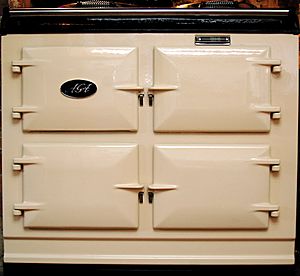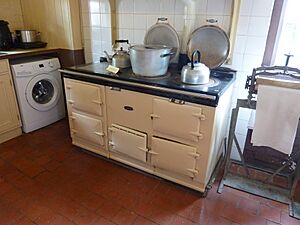AGA cooker facts for kids
| Lua error in Module:WikidataIB at line 168: attempt to index field 'wikibase' (a nil value). | |
| Inventor | Gustaf Dalén |
|---|---|
| Inception | 1922 |
| Manufacturer | AGA Rangemaster Limited |
| Available | Yes |
| Website | Lua error in Module:WikidataIB at line 168: attempt to index field 'wikibase' (a nil value). |
The Aga Range Cooker is a special type of cooker that was first invented in Sweden. It's known for staying warm all the time, which helps it cook food in a unique way. While it started in Sweden, most AGA cookers have been made in the United Kingdom since 1957. In 2015, the British company that made AGA cookers was bought by an American company called Middleby.
Contents
How the AGA Cooker Was Invented
The AGA cooker was invented in 1922 by a Swedish scientist named Gustaf Dalén. He was a physicist and even won a Nobel Prize! Dalén worked as the main engineer for a Swedish company called AGA. The name "AGA" comes from the Swedish words "Aktiebolaget Gas Accumulator."
Gustaf Dalén had an accident while working on another invention. He lost his eyesight. While recovering at home, he noticed his wife was very tired from cooking. He wanted to create a new stove that was easier to use and could do many different kinds of cooking.
Dalén came up with the idea of a "heat storage" cooker. This means the cooker stores heat inside it. He combined a heat source, two large hotplates, and two ovens into one unit. This was the first AGA Range Cooker.
The AGA cooker came to the United Kingdom in 1929. It became very popular, especially in larger homes. People even started using the phrase 'AGA saga' in the 1990s. This term described stories about people who lived in fancy country houses and often owned an AGA cooker.
A famous advertising person named David Ogilvy actually started his career selling AGA cookers. He even wrote a sales guide for the product in 1935.
The parts for AGA cookers were made from cast-iron. For many years, these parts were made at a place called the Coalbrookdale foundry. However, in November 2017, the new American owners, Middleby, closed this site.
How Much Energy Does an AGA Cooker Use?
Traditional AGA cookers are designed to be "always on." This means they use energy all the time to stay warm. For example, a small, traditional two-oven model that runs on gas uses about 425 kilowatt-hours (kWh) of energy each week.
To give you an idea, a regular gas oven and stove top use much less energy. An AGA cooker can use about 38 times more gas in a week than a standard oven and hob. This is almost as much gas as a standard oven uses in nine months!
However, if you have an electric AGA cooker, all the heat it produces can help warm your home in cold weather. The company that makes AGA cookers has also worked to make them use less energy.
Many newer AGA cookers can be programmed. The "Total Control" model, released in 2011, can be switched on and off like a regular cooker. This helps save a lot of energy. Some oil-burning models can also be updated with modern parts to burn fuel more efficiently.
Different Types of AGA Cookers
AGA cookers come in different sizes. You can find models with 2, 3, 4, or even 5 ovens. The 4 and 5 oven versions are wider than the others. Traditional AGA cookers have special hotplates: one for boiling and one for simmering. Newer models might have one hotplate that can switch between boiling and simmering modes.
While classic AGA models stay on all the time, newer ones are more flexible. Models like the AGA 60, Total Control, and 3 Series can be turned on and off when you need them. The hotplates on "Dual Control" cookers can also be switched on and off. This means you still get some warmth in the room, but you don't waste energy when you're not cooking. The AGA 60 is the smallest model, only 60 centimeters (about 2 feet) wide.
AGA cookers are known for lasting a very long time. Many are still working well after more than 50 years! In 2009, to celebrate its 80th anniversary, AGA Rangemaster held a competition. They wanted to find the oldest AGA cooker still in use. Thousands of people entered, and the winning cooker was installed in 1932. It belonged to the Hett family in Sussex, England.
Learn More
- Aga Rangemaster Group



